Spanish flashcards and French listening tests are part of a difficult but necessary path to mastering another language in the eyes of high school students, but for some, it’s a way of life. The number of students fluent in another language is on the rise, according to the Annie E. Casey Foundation that discovered roughly 22% percent of children speak another language at home than they do at school in the United States. In our own halls, 135 students–– primarily those who have immigrated to the United States––fluently speak a different language other than English. Many of these students, born outside of the United States, chose to learn a new language at school in addition to English.
Ale Calvo
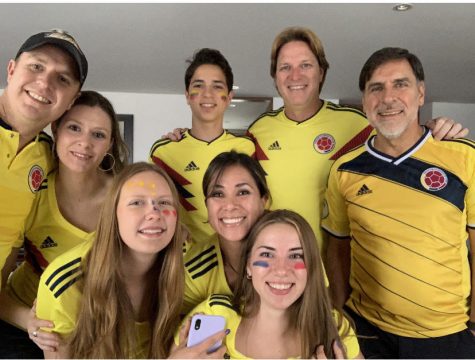
Junior Ale Calvo and her family celebrate the 2019 World Cup at her grandfather’s house in Colombia, South America. “My entire family gathered at my grandpa’s house to watch the game and we all dressed in our country’s colors. Soccer has always been a passion that my whole family shares, so to be able to watch the world cup with them was an amazing experience,” Calvo said.
The halls of Parkway West Middle School seemed daunting, and expansive to junior Ale Calvo when her father’s job was transferred her family from Buenos Aires, Argentina to St. Louis, Missouri in the sixth grade.
“We moved here because of my dad’s job. He works in Monsanto (now Bayer) and the headquarters were here in St. Louis. Although my life in Colombia was amazing, the opportunities I have in the United States are completely different. Here, I have a wider range of options when it comes to my future. The U.S. obviously has some of the greatest universities in the world and so many majors and careers that fit my interests. In Colombia it’s more limited,” Calvo said.
Calvo was born in Bogota, Columbia then moved to Mexico and Argentina, before transitioning to life in the United States. After her move in the sixth grade, Calvo turned to soccer to find new friendships.
“Soccer had always helped me make bonds that I would not have otherwise. When I was new to school and to the United States I joined Irene Yannakakis’s dad’s soccer team. This helped me build a connection with Irene and to this day she is one of my closest friends. Without soccer, I would not be where I am right now,” Calvo said.
Calvo’s advanced Spanish skills helped her serve as a student aide to Spanish teacher Eileen Rodriguez-Kiser last year to help other students learn Spanish, as a way to embrace her culture.

Calvo observes International Day while in school in Argentina in 2010. “I was dressed in my Colombia colors because everyone would bring traditional food and clothing to school and we would all see other culture’s dances and food as well,” Calvo said.
“I want others to know more about Colombia. Even my closest friends sometimes stereotype Colombia because of its bad history, but I want everyone to know that we have so much more to offer than that. Our music, food, beaches, fruits, landscapes are all beautiful. Colombia is very rich in culture, and an amazing place to visit on vacation,” Calvo said.
Calvo is learning French, in addition to her native Spanish, to help her interact with others abroad.
“Being trilingual has helped me so much, especially in traveling. One of my family’s greatest passions is visiting new countries. Last summer we traveled to Europe where we had to communicate with people from different nationalities. Since I know Spanish, English and French, I had three different options to try when I had to speak with someone foreign. Knowing Spanish and French also helps me understand similar languages like Portuguese and Italian, and I believe that this will be extremely helpful in my future,” Calvo said.
Nick Malchanav
Freshman Nick Malchanav can still recall his second grade school year when his family moved from Minsk, Belarus to the United States.
“In Belarus, we lived in the city in a high-end apartment, so it was different because I got used to the one floor but really big area. Here, the next thing I know there’s a basement, second floor and a living room [that we used to have] all on one floor. There was just a different feel to it here with a more friendly and trusting environment,” Malchanav said.
Malchanav spent a large part of his school day in elementary school learning English and adjusting to the new language, as he knew very little English upon his arrival in the United States.
“It was hard for me being in school, keeping up with everything and also not knowing the language. There was an English class I took inside of school, English as a Second Language (ESL). I was there for three hours of the day and that’s where I learned English. My mom was learning outside of her job when she started to work and the same with my dad. My sister and I were taking English inside of school, while my parents were taking it outside of their job,” Malchanav said.

Malchanav and his family explore London, UK while on vacation in summer 2019.
After learning English in elementary school, Malchanav enrolled in Spanish.
“To be totally honest, my parents made me take Spanish,” Malchanav said. “But I also thought it would help me because it is the most common language around the world. I thought it would help me in the future with job opportunities.”
Malchanav hopes that being trilingual will help him with his future career plans.
“I hope to do something with business and entrepreneurship,” Malchanav said. “I think it will help me in the future because I know jobs want people that can communicate well, and if I know more than one language then it could help me a lot.”
Nayeon Ryu

Two-year-old Nayeon Ryu stands with her father and older sister at Phuket in Thailand on vacation in 2004.
Senior Nayeon Ryu moved to the United States from South Korea in preschool, yet Ryu still recognizes the challenges of language barriers with others in her everyday life.
“Having a mom that does speak limited English, I feel even more of a personal duty to be able to make everyone feel comfortable when communicating and interacting. Hopefully my knowledge of three languages can help even one person that I meet in the future,” Ryu said.
Ryu speaks Korean at home and chose to explore Spanish in high school.
“I chose Spanish because I thought it would be the most helpful to have basic knowledge on since it is used globally. There’s a high chance of interacting with people who may have limited English, like my parents, and are more comfortable with Spanish, and even basic high school Spanish may be enough to communicate,” Ryu said.
Ryu was excited about the opportunity to take Spanish so that she could better communicate with others.
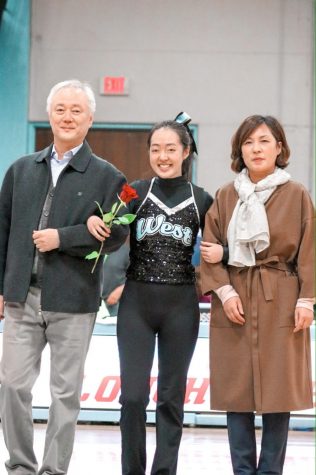
At senior night, senior Nayeon Ryu walks across the court with her parents flanking her, Feb. 25 during the halftime of the boy’s varsity basketball game against Kirkwood.
“[I took a third language] to have even the slightest bit of knowledge that another language could make a significant difference for things like working at a restaurant and meeting a customer whose English isn’t their first language, or maybe knowing an additional language is what makes or breaks you getting a job over another candidate. We all have the opportunity to learn a new language in high school, so why not take it,” Ryu said.
Looking ahead, Ryu believes that these skills will help her when interacting with new people from diverse backgrounds.
“I think having knowledge in three different languages will really help me in the future when I am out of the high school bubble and will be meeting, interacting and communicating with a truly diverse and global world and people that may speak limited English,” Ryu said.


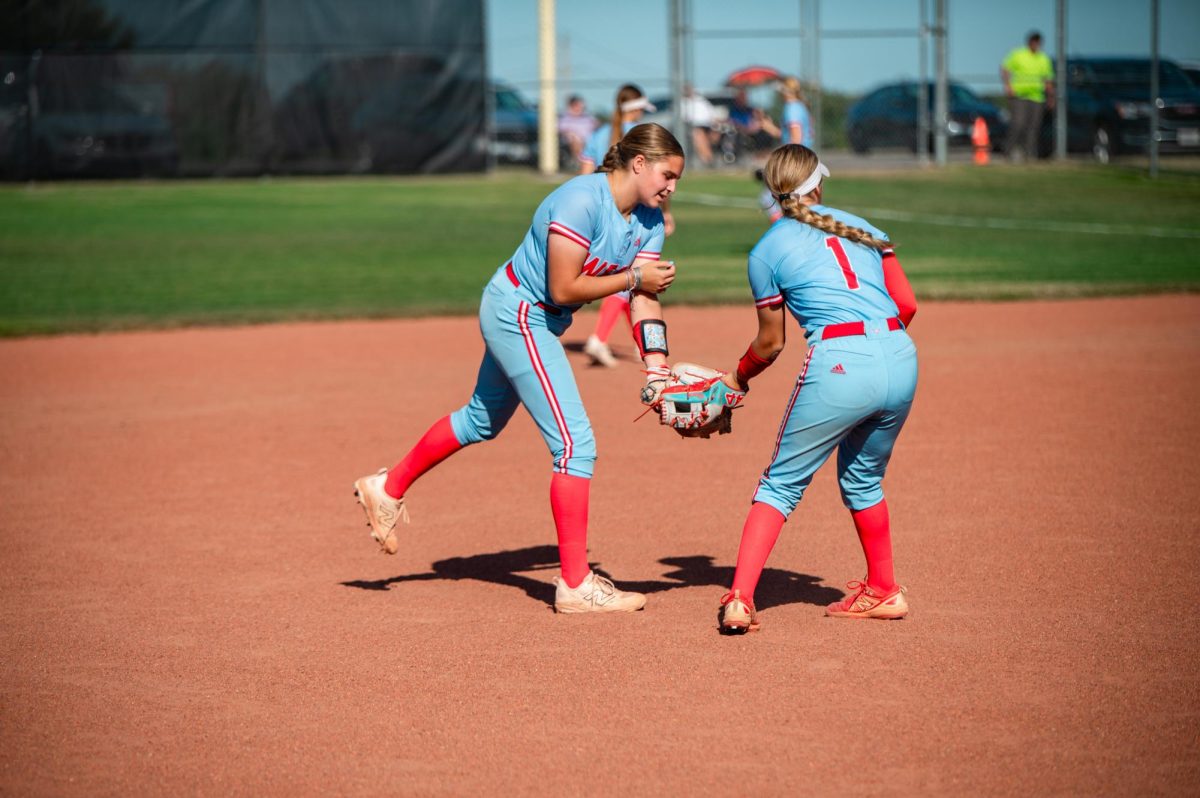
![Smiling in a sea of Longhorns, Fox 2 reporter Ty Hawkins joins junior Darren Young during the morning Oct. 3 pep rally. The last time West was featured in this segment was 2011. “[I hope people see this and think] if you come to [Parkway] West, you will have the time of your life because there are so many fun activities to do that make it feel like you belong here. I was surprised so many people attended, but it was a lot of fun,” Young said.](https://pwestpathfinder.com/wp-content/uploads/2025/10/Edited2-1200x798.jpg)

![Blue lights shining brightly, senior Riley Creely beatboxes into the microphone. Creely and the group began the performance in front of the blue lights, sparking interest from the audience. “The pep rally performance was fun. I got to beatbox for the first half of the song, which was hype. I liked to look into the student section [while I performed],” Creely said.](https://pwestpathfinder.com/wp-content/uploads/2025/09/DSC_5085-Enhanced-NR-1200x799.jpg)


![Hugging senior Ella Wheeler, senior Jamaya Love beams after scoring a touchdown at the Powderpuff football game on Sept. 11, putting the seniors on the scoreboard with a score of 6-2 above the juniors. The seniors went on to capture the victory with a final score of 12-2. “I was actually gassed [at this moment]. I was so tired. But, everyone on the sideline, all my teammates and everybody in the stands were cheering,” Love said.](https://pwestpathfinder.com/wp-content/uploads/2025/09/DSC1735-Enhanced-NR-2-1200x799.jpg)
![Raising her hands in the air, freshman Jillian Sternhagen follows Mr. Mooney’s lead during an activity Aug. 15 at freshman orientation. Surrounded by other freshmen, Sternhagen learned an “A O E day” chant to help remember their new weekly high school schedule. Students participated in several activities to get to know each other, the school and the upperclassmen. “We got to tour the school and learn where everything in our schedule is. The energy [at orientation] was fun; the leaders were peppy and got us excited,” Sternhagen said.](https://pwestpathfinder.com/wp-content/uploads/2025/08/DSC_0145-1200x798.jpg)
![Shifting global trade, President Donald Trump’s tariffs are raising concerns about economic stability for the U.S. and other countries alike. “[The tariffs are] going to pose a distinct challenge to the U.S. economy and a challenge to the global economy on the whole because it's going to greatly upset who trades with who and where resources and products are going to come from,” social studies teacher Melvin Trotier said.](https://pwestpathfinder.com/wp-content/uploads/2025/05/MDB_3456-1200x800.jpg)
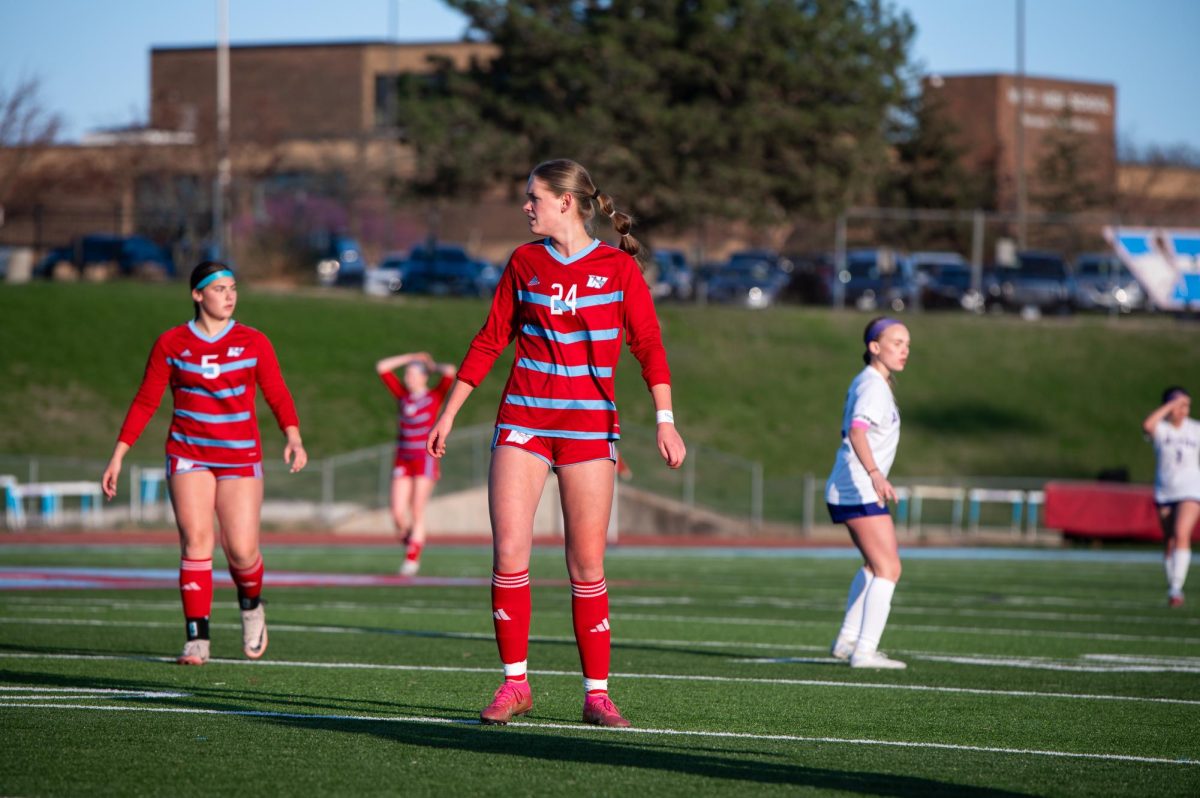
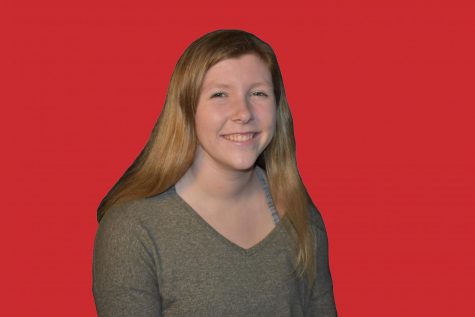
Grace Steensma • Mar 6, 2020 at 7:31 pm
Very nice article!